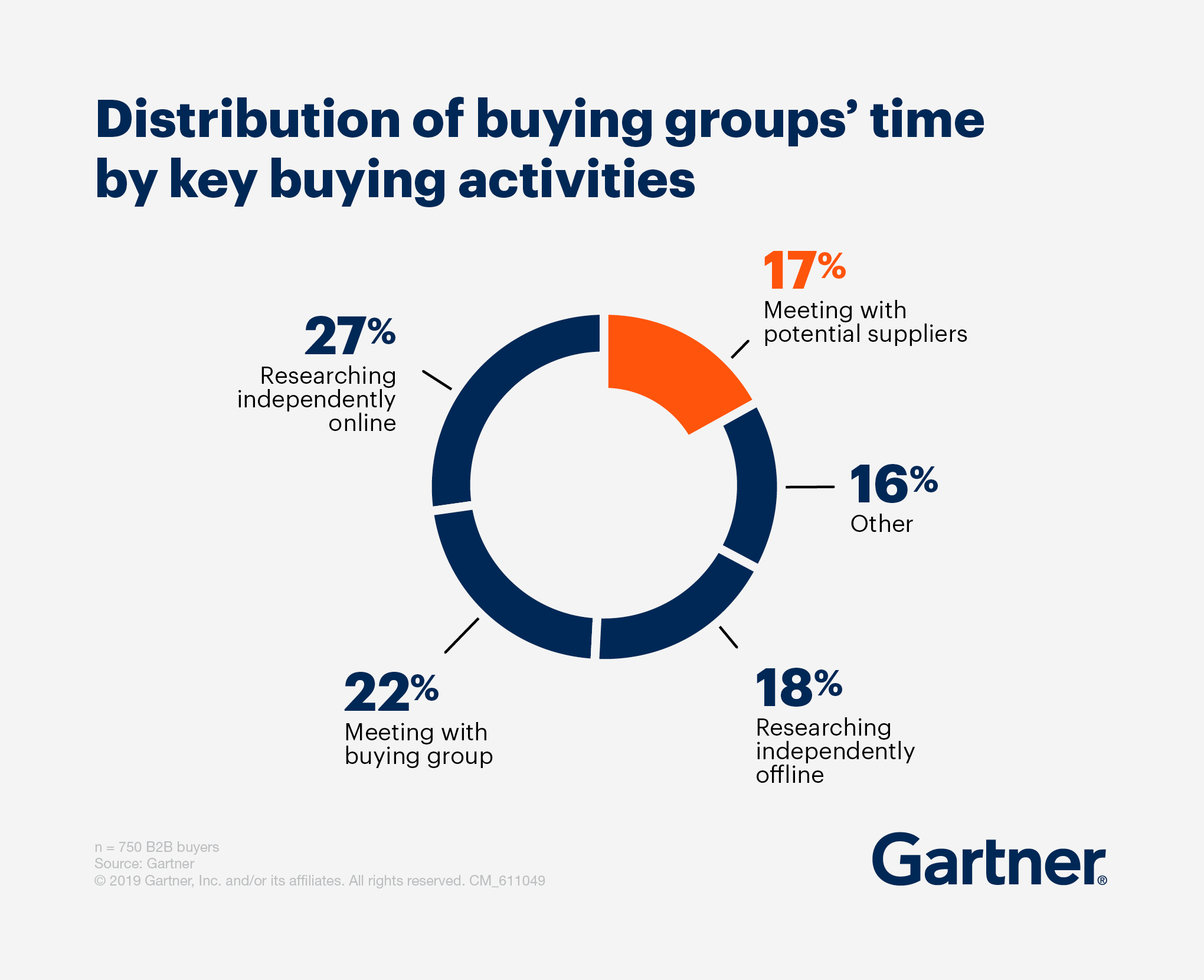Technology has completely revolutionized the way businesses communicate with customers and prospects. Modern sales reps depend on a number of tools everyday to execute their tasks. Consequently, traditional in-person sales meetings have become far less common than they once were.
But, even as the sales process becomes increasingly technology-driven, face-to-face meetings still dispense certain benefits that nothing else can replicate. This is where outside sales, commonly referred to as ‘field sales’, comes into the picture.
The fact that close to 52.8% of sales professionals in the US today are engaged in outside sales easily justifies why this particular approach is vital if a business wants to accelerate its growth.
That being said, there are several critical tasks every outside sales team needs to execute in order to stay ahead of the competition and achieve promised results. In this piece, we’ll be looking at a few.
1) Establishing Rapport with Prospects
A purchase decision isn’t just about the product or service being pitched— buyers want to buy from businesses they know and trust. Recent sales statistics show that 19% of buyers want to connect with a salesperson during the awareness stage of their buying process, when they’re first learning about the product; 60% want to connect with sales during the consideration stage, after they’ve researched the options and come up with a short list; and 20% want to talk during the decision stage, once they’re decided which product to buy.
Field sales teams understand the value of personal interactions, as they spend most of their workdays on the road meeting with leads and customers. Field sales reps have honed a different skill set as compared to their inside sales counterparts, performing hands-on tasks to drive deals forward and playing a more informative role in the buying process by developing good rapport with prospects.
With the Coronavirus pandemic creating havoc across the world, a majority of businesses are functioning remotely. Since face-to-face meetings are going to be discouraged for some time now, field reps are leveraging virtual communication platforms to interact with prospects.
These virtual meetings need to be focused on the prospects’ needs and how your product or service can help them rather than just talking about your business offerings. The platform of interaction doesn’t matter. Once the prospects start seeing value in the meeting, they’ll leave the meeting feeling like they got to know you and your company in person.
Hence, establishing a connection with the lead is one of the most critical sales tasks every field sales team needs to prioritize upon.
2) Identifying Customer Needs and Tailoring the Pitch Accordingly
The ground rule for building a successful sales strategy is – the main focus of the sales pitch should always be the client. Field sales are no different.
A seller who adopts the buyer’s perspective in their approach to a customer meeting ends up engaging the buyer more constructively. This happens because they view things in the same light as the buyer, inhabiting their world and speaking to the challenges, pains and fears.
One advantage with field sales is that you have the potential client right in front of you. Therefore, identifying needs and tailoring the pitch accordingly to close the deal becomes much easier.
Comparison charts are something field reps often use to justify why their offering is the best option in the market right now and why the prospect should be choosing them over their counterparts. On seeing the comparison chart, if the potential customer says something like – “But the other company is offering this feature, and it is exactly what I’m looking for”, the field rep can then tailor the offering a bit and say, “How about you try our service/product free of cost for a month and then decide?”
When you see the buying signs from a potential customer, you need your sales pitch at the ready. A strong sales pitch could be the difference-maker that ensures the answer to that question is ‘you’.
Therefore, identifying customer needs and pain points and tailoring pitch accordingly thereafter is something every field sales team should be well-versed with. The responsibility of executing this critical task and getting results squarely lies on the shoulders of the field sales team.
3) Presenting High-Level Insights into the Offering
A lot has been said about the need to get insights to the table when you’re having meetings with both – your potential or existing customers. In today’s world, where buyers are more informed than they’ve ever been, it is comprehensible that you need to do more than just communicate the capabilities of your company’s offering. Field sales teams constantly struggle to decide where to start, and some even flounder when trying to develop an ‘insight machine’ that scales.

According to Forrester Research, 64% of senior executives believe that salespeople do not know enough about their buyer’s business to bring any worth to an interaction. In fact, only 25% of them are prepared to take a second meeting. If you give this a sincere thought, you’ll be able to comprehend that three out of every four sales meetings are both a waste of money and time— for the seller as well as for the buyer.
Field sales teams that leverage insights as a core feature of the sales engagement strategy are said to deliver more successful sales pitches. One recent research from SiriusDecisions also indicates that providing business and industry expertise is four times more valuable than developing good relationships and having product knowledge. That’s the real value of a well-fabricated insight.
Insights are completely different from traditional marketing techniques since the former help your customers discover problems (or opportunities) that they didn’t even know existed in the first place. On the contrary, traditional marketing approaches sell to a buyer’s identified needs.
You want to deploy the insights in a way that they lead to your offering’s capabilities mapped to the customer’s unknown or known needs, rather than use traditional marketing approaches that stress on leading the pitch with the offering instead. For this very reason, presenting high level insights into the company’s offering is one of the most critical tasks a field sales team must execute.
4) Streamlining Longer and Complex Processes to Close Deals Faster
When it comes to turning an interested lead into a client for your business by leveraging the outside sales approach, the process of selling can be a long and intricate one. At times, it can take upwards of weeks or even months to convert an interested prospect to a new client.
The process is way different than acquiring a customer through inside sales since everything happens digitally there – right from the responses being far more quicker to saving up on all that additional time spent traveling to prospect.
There are many steps and details to remember when it comes to managing a field sales team, and it can be overwhelming to keep track of all these moving pieces when you’re juggling multiple deals while trying to pitch leads in person. A territory management software can be of great help here since it drives sales performances by modeling your sales territories to your business.
An outside sales team is often expected to create and map out a process that can be used by the entire team to track each deal. The idea is to have a documented process that everyone can follow so everyone’s on the same page and knows where each deal is, how many are on the go, and what needs to be done next.
In order to streamline longer and complex processes to close deals faster while each team member is on the go, an outside sales team usually:
- Maps out all the steps in the potential client’s journey;
- Defines major stages of the sales process right from enquiring about a prospect’s pain points to qualifying their offering as a potential solution, quoting as well as negotiating so that the deal gets closed to actually closing it;
- Tracks and optimizes the sales process;
- Tries to figure out which stages take a longer time to get completed within the process and looks for ways to speed those up.
By creating and sticking to a streamlined process, the sales team ends up improved efficiency, saves time and eventually closes more deals faster. This also acts as a great training process when getting new hires onboard.
5) Managing Flexible and Varied Schedules Effectively
According to one finding by The Brevet Group, it takes 10 or more months for a new sales rep to be fully productive. That being said, getting maximum productivity in sales activities is not just a new sales rep’s problem, it rather is every sales rep’s problem, more so if you’re into field sales.
All employees are bound to experience a productivity slump at some point in their career, and it can be hard to get over it once fallen into. Better time management can be the solution to this ever persisting problem— however, field sales teams also have their own unique challenges due to highly irregular schedules and flexible work days.
Most salespeople have certain goals when it comes to building relationships and prospecting with customers. The most productive field reps, however, keep track of their activities in order to observe if they are getting near their goals and to help properly analyze their next actions.
To start, they set a specific number of people to prospect each day, and check results at the end of the day to see if they’ve successfully hit that number. Tracking their activities also allows them to figure out the next step and helps them test their capability in a given time frame—then maximize it.
One of the keys to effective time management is setting a schedule—and sticking to it. All you need is discipline! A field sales enablement software like SPOTIO can also be helpful to drive next level productivity.
About the Author

Ali Mirza
Founder & President
Rose Garden Consulting
Ali Mirza is the Founder and President of Rose Garden Consulting and has helped his clients reach the Inc 500 list and triple their revenue in less than a year. As a leading sales expert, he has closed over $200 Million dollars in sales using his conversation methodology. He is also the host on the For The Close Podcast and is currently writing his first book, Predictable Closing due out in 2020.
___________
SPOTIO is the #1 field sales acceleration platform designed specifically for outside sales managers and reps to squeeze every drop out of their field sales efforts.







